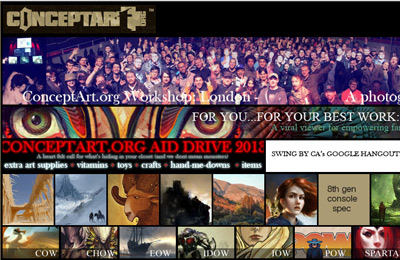Artists could learn a lot from athletes. I'm not talking about the big muscles, fancy outfits, or the cheerleaders. Instead, I'm talking about the team. Unless you work in an art studio you're probably painting on your own. Especially for learning, this can be a challenging situation. In this post I'll talk about the importance of community for artists, and the value of peers.
Even solitary athletes like golfers and runners train on teams. Sure, the moment of competition might be a solitary challenge - but every bit of rehearsal and training took place with a group of peers and a coach. The team format confers a great many benefits, but today I want to focus on the psychology of learning. Painting, like basketball, running, or golf, is a technical skill. It's hard to learn. There are days when it seems like you're destined to fail. Unlike basketball or running, artists don't often have a coach or teammates - making the hard days much harder. Some personality types are able to flourish even without the social feedback of peers, but most need a network to succeed.
If you don't go to art school, it's still important to surround yourself with other learning artists. luckily there are a large variety of options, so let's take a look at some:
Join a Club
If you're a student, there's probably a community of like-minded artists nearby. If a club for your interest (concept art, book cover illustration, etc.) doesn't exist yet - start one! Meeting routinely is a great way to improve your artwork. If you've ever seen joggers training in pairs, there's a reason for this: mutual accountability. By hosting or attending a club meeting, you're agreeing to bring your best work - and that positive feedback will empower everyone around you. Clubs can be centered around critiquing work, creating a group project, or simply talking about recent developments. I spent a year meeting once a week with artist friends to discuss our progress toward various goals. None of us shared a medium (there were songwriters, play-writes, illustrators and more) but we all shared a drive for personal improvement. We were all practicing, training, and creating. Getting together turned that into a social event!
Participate in Online Challenges
My favorite is conceptart.org, though there are many sites which follow a similar format. The general idea is that a moderator routinely offers a prompt with a deadline, and artists are invited to create work and discuss their progress. Some of these end with a 'winner', though the important part is the community interaction. These are nice because you're able to see the progress images (sketches, etc) from a variety of artists - seeing different ways to approach each prompt. Additionally, if you want feedback or critique, the community is generally happy to give it. And don't just do one of these - make a habit out of it! If you become a 'regular' in one of these competitions, you'll have a much easier time getting meaningful feedback. Everyone is making a 'social investment' by participating, and familiar faces are highly valued.
Attend a Local Life Drawing Session
Sitting in a dim room with other artists and drawing can't be simulated on the internet. Even if you're not going to art school, there's nothing stopping you from attending a local life drawing session. Each session is different, but many focus on drawing the nude figure with traditional media. This is a great way to meet other artists.
Join an Online Course
The videos on Ctrl+Paint are my favorite way to teach digital painting, but some artists prefer the student / teacher relationship. If you're looking for this, but still want to learn on the internet, you might want to check out CGMA, Chris Oatley's Magic Box, or Schoolism. Each of these offers online education combined with community interaction. I've not attended the classes personally, but I'm told that they're all wonderful.
I'm also excited to announce that I've teamed up with the Lamp Post Guild & Pathwright to create an interactive version of Digital Painting 101. Launching today, this course is my first collaboration with LPG, and I'm excited about what the future might hold. The Pathwright system is extremely cool - it takes the Ctrl+Paint content and powers it up with quizzes, assignments, and community interactivity. The digital painting 101 course is free, but the other LPG courses are definitely worth checking out!
What Will You Do?
I've given a few examples here, but there are many more options. What will you do? This is a topic I'd love to see discussed in the comments, because we're all in the same boat. Learning online is... hard. Hopefully we can share some good ideas, and figure out good ways to find our art team , both online and off.




